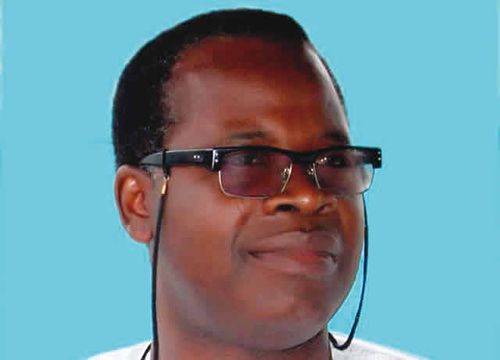Akin ATOLUGBOKUN
An axiom credited to Nelson Mandela pointed out that you only need courage to start taking up a task you think is impossible, to find out that it is indeed possible! That philosophy reminds me of when I had to split a log of wood. I was just twelve years old then; my dad who had the strength to do the splitting was away on a journey and my elder brothers who were to take up the task were also not around! I was left in the house with our mother who too was a bit down with fever. My mother called me by my cognomen (oriki) and appealed to me to take up the axe to split few pieces from the log of wood which she would use to make fire for cooking herbal concoction – agbo for her fever and to prepare food for us. At that time, there were no alternatives for making fire than for village dwellers to use dry woods. Compounding the task before me was that the day was wet and damp; otherwise I would have ventured into the surrounding bush to fetch firewood. Splitting a log of wood then was a task I had never thought would be my role in the household but that day I had no choice if not to save my mother’s life from the feverish bondage, it was for my rumbling stomach yearning for food; emboldened by my mother’s appeal, I started on the log of wood scrapping out small pieces from left and right of the log. At just one determined stroke, I made a little crack on the centre of the wood and I drove in a wedge into the crack like I used to see my dad do while splitting log. I kept striking on the spot and cracked open larger and larger until the wood split into two, which made it easier for me to turn the log into several splinters – the task was accomplished! My mother was able to brew her concoction and my stomach was filled up! My dad and the elder brothers came home to behold the feat I had performed and I was showered with praises especially from my dad who used to think of me as a feeble little kid that could not be assigned strenuous task. Have you ever wondered on how enormous would a loaf of bread look like in the view of a tiny creature like ant? Obviously it could be compared with the feeling a human being would have when looking at the awesome magnitude of Mount Kilimanjaro which stands in the air to the height of 5 five miles or eight (8) kilometers above the sea level! Now, leave that loaf of bread in an open place for a while; by the time you look back you will surprisingly find the tiny ant on the “enormous” bread trying to scrape bits off it for its pantry. The highest mountain in the world, the Everest Mountain, that nobody ever thought could be climbed to its uppermost peak was indeed conquered by a duo of mountaineers, Hilary and Tenson.
I once asked a wealthy old friend how he became rich. He is not the type of this modern day rich people who got rich through diabolical or fraudulent ways, he was indeed a transparent honest person. The old man simply replied; “Visualize a level of success in your understanding, do not entertain fear, work against negative thoughts and wrong advice, be honest with people that come in your way, don’t brood on disappointment or failure, always keep your target in view and prayerize your efforts.” With the application of those measures, which of course are not in any way easy or pleasurable, he added, “the sky is your limit. If you are able to take such pains you would always find ways where you thought there was no thoroughfare,” the old man concluded.
Truly, there is no royal way to success. Every achievement has its hazards, stumbling blocks, discouraging thoughts, indecisive tendencies, fear, all sorts of discouraging elements, but if someone really wants to achieve, he/she should keep on trying and trying. Nothing good comes so easy. There is honey inside the rock; whoever wants to lick the honey will not care to have his axe blunted However a question is asked; “How do you ply your way to success – aggressive forceful way or subtly in calculated steps? Both are capable of yielding the expected result but one is less hazardous than the other. Surely, there is possibility in presumed impossibility.
The foregoing is an oracle divining for the ongoing agitation for the creation of “Oodua Nation,” which some people are entertaining fears on, that it cannot be possible viz-a-viz incoherent unity among the Yoruba people, doubtful economic viability, and the provision of Nigeria’s constitution, which harps on the sovereignty of the republic and all sorts of fetters and sentiments. The oracle divines: Oodua Nation is a possibility if Yoruba people really want it – they only need to start pursuing the cause. The issue of incoherent unity among the Yoruba people is not deep rooted. Ask: how did Yoruba people collectively prevent the Fulani from carrying their conquest across Yoruba land to the coast in the 19th century? Ask: how did Yoruba people act in unison to vote for MKO Abiola in 1993 general elections? Ask: how did Yoruba governors irrespective of their political leaning hold a brotherhood meeting at Ibadan in 2019 based on the way forward for Yoruba and in the polity of the nation? Ask: how did the Yoruba governors irrespective of the parties they belonged to unanimously agree to establish a security outfit in the form of Amotekun? Ask: how did Yoruba people come together to form a security apparatus called OPC – Oodua Peoples Congress? Now that the Yoruba race is facing total annihilation from the powers that be in Nigeria, how much more must Yoruba people stick and work together to bring about Yoruba nation sovereignty? On the issue of economic viability if Oodua nation comes to be, the fear is baseless! The south west, the abode of Yoruba people is very rich in both human and material resources. In the pre-independent and about half a decade after independence, the western region was in the front of other regions of Nigeria in terms of economic viability and physical development. The feat performed by the west as a region then can still be performed as a nation now. Look at the world map, you will notably find nations that are not as large as the south west of Nigeria, you would want to ask how do they survive as a nation! Oodua nation is viable and Yoruba people have been in the forefront before – such sustainability can still be repeated today. On the issue of constitutional fetters, it is the man that made the law and not the law that made the man. The law should be made to reflect the wish of the generality of the people – the constitution is subject to amendment or at most abrogation – before and after independence, Nigeria has moved from one constitution to another. Why can’t the obnoxious 1999 constitution be changed to reflect the wish of the people? Of what relevance is a constitution that binds some groups but leaves some as sacred cows to freely operate in the same polity?
Like I am wont to say, the easterners are performing experiment and are advancing. In 1966 when they started it, they adopted aggressive militant approach and it resulted into the Nigerian civil war between 1967 and 1970. The Igbo people failed at the time simply because other federating units saw no reason for a part to want to secede and jointly fought the move. Now, that every federating unit is aware of the ulterior motive of a unit that wants to perpetuate itself in power to the detriment of the others, no unit cares any longer to castigate another for taking steps to emancipate its people, the United Kingdom (UK) has granted asylum to members of Biafra agitators, a sort of international recognition you may want to note! Even though with their aggressiveness, the Igbo agitators are leading, in the forefront for tribal sovereignty.
Just like the easterners, the westerners have started their own agitation and it is daily gaining momentum – but unlike the Igbos, Yorubas are going about it subtly with calculated steps. Yoruba are noted for diplomatic approach to burning issues. The Yoruba’s advice to the federal government during the aforementioned civil war resulted into victory for the federal government; although the Head of State then said, “there was no victor no vanquished.” Those who were vanquished knew they were vanquished. You want to know how Yoruba performed the feat. Wade into the acts and deeds of that Yoruba gallant hero, Chief Obafemi Awolowo.
Someone asked me what would happen to Abuja, the seat of the federal government in which all the federating units have so much invested if things fall apart. I asked him to go and find out what happened to the city of Moscow when things fell apart in the world’s biggest union in Asia.

